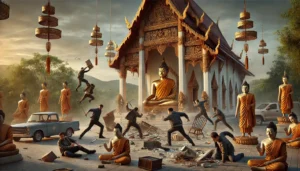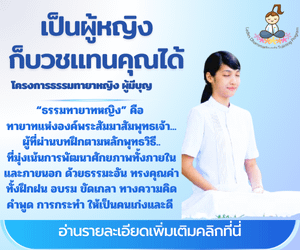ในโลกที่เทคโนโลยีและอินเทอร์เน็ตเข้ามามีบทบาทสำคัญ การเผยแพร่ธรรมะและสิ่งดีงามเป็นเรื่องที่น่ายกย่องและก่อให้เกิดบุญกุศลอย่างมหาศาล แต่ในทางกลับกัน โลกออนไลน์ก็เป็นเหมือนดาบสองคม ที่อาจนำพาไปสู่การสร้างบาปโดยไม่รู้ตัว โดยเฉพาะอย่างยิ่งการมีส่วนร่วมในการตำหนิติเตียน ประจาน หรือจับผิดพระภิกษุสงฆ์ แม้ว่าท่านจะทำผิดจริงก็ตาม
พระสัมมาสัมพุทธเจ้าทรงตรัสสอนไว้ว่า การกล่าวโทษผู้มีศีลบริสุทธิ์ เป็นบาปหนัก ยิ่งในยุคนี้ที่โลกออนไลน์เชื่อมโยงผู้คนเข้าด้วยกัน การกระทำใด ๆ ก็ตาม ย่อมถูกเผยแพร่ไปอย่างรวดเร็วและกว้างขวาง การตำหนิพระสงฆ์แม้เพียงครั้งเดียว อาจส่งผลกระทบต่อจิตใจของผู้คนจำนวนมาก ทำให้เกิดความเสื่อมศรัทธาในพระพุทธศาสนา บั่นทอนกำลังใจของผู้ปฏิบัติธรรม ซึ่งผลกรรมที่เกิดขึ้นย่อมตกอยู่กับผู้กระทำเป็นแน่
ในสังคมยุคปัจจุบัน หลายคนอาจหลงลืมไปว่า บุญบาปเป็นสิ่งที่ติดตัวเราไปแม้ตายแล้ว ไม่ใช่แค่เรื่องเล่าหรือความเชื่อ แต่เป็นหลักธรรมคำสอนที่พระพุทธองค์ทรงยืนยัน ดังนั้น ก่อนจะแสดงความคิดเห็นใด ๆ ควรไตร่ตรองให้รอบคอบ อย่าปล่อยให้อารมณ์ชั่ววูบ หรือความคึกคะนอง นำพาไปสู่การสร้างกรรม
การวิพากษ์วิจารณ์พระภิกษุสงฆ์โดยขาดสติ เปรียบเสมือนการทำลายรากฐานแห่งพระพุทธศาสนา ซึ่งเป็นที่พึ่งทางใจของคนไทยมาช้านาน แทนที่จะตัดสินผู้อื่นด้วยความคิดแบบโลก ๆ เราควรหันมาพิจารณาตนเอง ให้ความเคารพผู้มีศีล และตั้งมั่นในการทำความดี เพื่อสั่งสมบุญกุศล ซึ่งจะเป็นเสบียงติดตัวเราไปในภพหน้า
จำไว้ว่า “บุญบาป” ไม่ใช่เรื่องเล่น ๆ อย่าปล่อยให้โลกออนไลน์ เปลี่ยนเราให้กลายเป็นผู้สร้างบาปมหันต์โดยไม่รู้ตัว
The World Unaware The Grave Sin of Criticizing the Virtuous in the Age of the Internet
In a world dominated by technology and the internet, spreading Dharma and goodness is commendable and generates immense merit. However, the online world is a double-edged sword that can lead to unintentional sin, particularly through participating in criticizing, shaming, or finding fault with Buddhist monks, even if they have made mistakes.
The Buddha taught that speaking ill of the virtuous is a grave sin. In this era, where the online world connects people, any action can be disseminated rapidly and widely. Criticizing a monk, even once, can impact the minds of many, leading to a decline in faith in Buddhism and discouraging those practicing the Dharma. The karmic consequences inevitably fall upon the perpetrator.
In today’s society, many may have forgotten that merit and demerit (karma) stay with us even after death. It’s not just a tale or belief, but a core teaching confirmed by the Buddha. Therefore, before expressing any opinion, one should carefully consider and not let momentary emotions or excitement lead to creating negative karma.
Criticizing Buddhist monks without mindfulness is like destroying the foundation of Buddhism, which has long been a spiritual refuge for many. Instead of judging others with worldly thoughts, we should turn inwards, respect the virtuous, and be steadfast in doing good to accumulate merit, which will be provisions for our future lives.
Remember, karma is not a trivial matter. Don’t let the online world turn us into unwitting creators of immense sin.


















